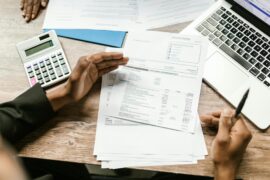This article may contain references to products or services from one or more of our advertisers or partners. We may receive compensation when you click on links to those products or services. Nonetheless, our opinions are our own.
- Key Highlights
- Introduction
- Understanding Credit Card Reporting Dates
- The Importance of Knowing Your Reporting Date
- How Reporting Dates Affect Your Credit Score
- Preparing to Find Your Reporting Date
- A Simple Guide to Finding Your Reporting Date
- Tips for After You Find Your Reporting Date
- Conclusion
-
Frequently Asked Questions
- Can the reporting date vary from month to month?
- What will I do if my credit card company will not share the reporting date?
- How often do credit scores change after the reporting date?
- Does paying my balance before the reporting date help my credit score?
- What is the difference between the reporting date and the due date?
- Recommended Reads
Key Highlights
- Knowing when your credit card reports information helps you take care of your credit score.
- Your credit card company usually shares details with credit bureaus close to your statement closing date.
- Knowing when credit reports are done helps you manage how much credit you use and how well you pay.
- You can find out your reporting date by checking online banking or asking your credit card company.
- Being aware of how credit reporting works helps you make smarter decisions with your money.
Introduction
Your use of a credit card can change your credit report. It’s important to know key details like your credit card reporting date. This is the day when your card issuer sends details about your account. This includes your balance and payment history to the main credit bureaus. Because these reports affect your credit score, knowing your reporting date helps you manage how much credit you use. It also lets you plan your payments better.
Understanding Credit Card Reporting Dates
A credit card reporting date is when your card issuer gives your account details to the credit bureaus. Most issuers report once a month, but not every company follows the same timing. Each one has its own reporting schedule.
Typically, your reporting date matches the date your statement closes. This is the end of your billing cycle. Once your statement is closed, your issuer sends a report of your activity to the credit bureaus. They then use this information to help calculate your credit score.
The Importance of Knowing Your Reporting Date
Knowing your reporting date helps you manage your credit well. Here’s why it is important:
- Smart Payments: If you know when your bank tells you about your balance, you can make payments before that date. This keeps your credit use low and helps you have a strong credit score.
- Credit Score Tracking: Since banks report around the same time each month, you can look at your credit report soon after. This helps you see any changes.
- Careful Money Management: Knowing when updates happen lets you expect changes in your credit. This way, you can do something if you need to.
How Reporting Dates Affect Your Credit Score
Your reporting date directly affects two important credit factors:
- Credit Utilization: This is a number that shows how much you owe on your credit card compared to how much you can use. A lower number is good for your score. You can lower this number by paying off your balance before your reporting date.
- Payment History: Paying your bills on time helps your credit score. If you pay what you owe before the reporting date, your report will show a smaller balance, which shows good habits.
Preparing to Find Your Reporting Date
Before you look for your reporting date, collect important information first. Having your credit card details ready will help you find the date faster.
Gather Necessary Information
To find your reporting date easily, make sure you have:
- Credit card details: Your account number, username, and password for online use.
- Account balance: Checking your balance helps to see if the reported information matches your records.
- Social Security number: Some companies need this for identity checks.
Tools and Resources Needed
To find out your reporting date, use this:
- Online banking: Most banks let you see your statements, billing cycles, and transaction history.
- Credit reports: Your report from Equifax, Experian, or TransUnion usually shows the latest reporting date.
- Free credit reports: Go to AnnualCreditReport.com for free weekly credit reports.
A Simple Guide to Finding Your Reporting Date
Finding your credit card reporting date is easy. You can look it up online or call customer service. While each company may show the information a little differently, the basic process is the same.
Step 1: Log into Your Online Banking Account
Start by logging into your credit card’s online site. If you do not have an account, sign up on your issuer’s website. You will need to give your credit card details and check your identity.
Once you are logged in, go to the “Account Summary” or “Statements” section to see your billing details.
Step 2: Locate the Statements Section
In the statements section, you can find a list of past statements. There is also a dropdown menu so you can choose specific billing cycles.
- Pick the most recent statement or an older one.
- Find the statement date or billing cycle date—this is often the report date.
Step 3: Identify the Statement Closing Date
Your statement closing date is usually shown as “Statement Closing Date” or “Closing Date” on your statement.
Example:
| Statement Date | Due Date |
|---|---|
| June 25, 2024 | July 21, 2024 |
In this case, your issuer probably shared your June activity around June 25, 2024.
Step 4: Contact Customer Service for Confirmation
If you can’t find your statement closing date online, just call your credit card company. You can usually find their phone number on the back of your card or on their website.
When you call, ask for your reporting date. The representative might request proof of who you are, like your account number or the last four digits of your Social Security number.
Tips for After You Find Your Reporting Date
Once you know your reporting date, use it to manage your credit well. By lining up your payments and spending with this date, you can keep your credit in good shape.
Watch Your Credit Use Before Reporting Day
Your credit utilization ratio affects your credit score a lot. Try to keep it under 30% for each card and in total.
If you think there will be high spending during a billing cycle, try making a mid-cycle payment before the reporting date. This can help lower the balance that gets reported.
Planning Payments Around Your Reporting Date
Paying several times during the billing cycle can help lower your reported balance. It also makes sure you pay on time. You can set up automatic payments or reminders to avoid late fees.
If you plan to apply for a mortgage or a loan, do not open new credit accounts in a short time. When you apply for credit, it causes hard inquiries that can lower your score for a while.
Conclusion
Knowing when your credit card reports is important for a good credit score. By keeping track of how much credit you use and planning your payments around this date, you can improve your money health. Use online banking, check your credit reports, and reach out to customer support to find your reporting date. Stay active and manage your credit to make your money future better.
Frequently Asked Questions
Can the reporting date vary from month to month?
Yes, reporting dates can change a little because of differences in billing cycles. If you see any issues, reach out to your issuer for help.
Issuers do not have to share their reporting dates. If your issuer does not provide this information, monitor your credit reports closely to identify any trends in the reporting.
How often do credit scores change after the reporting date?
Credit bureaus usually update your credit report a few days after they get information from your issuer. But the exact timing can be different.
Does paying my balance before the reporting date help my credit score?
Yes, paying your balance before the reporting date lowers your usage, which can help your credit score.
What is the difference between the reporting date and the due date?
- The reporting date is when your issuer shares account details with the credit companies.
- The due date is when your credit card payment needs to be paid. Always pay at least the minimum by this date to avoid late fees and bad credit marks.

Reviewed and edited by Albert Fang.
See a typo or want to suggest an edit/revision to the content? Use the contact us form to provide feedback.
At FangWallet, we value editorial integrity and open collaboration in curating quality content for readers to enjoy. Much appreciated for the assist.
Did you like our article and find it insightful? We encourage sharing the article link with family and friends to benefit as well - better yet, sharing on social media. Thank you for the support! 🍉
Article Title: How to Find Your Credit Card Reporting Date in Under 5 Minutes
https://fangwallet.com/2025/03/06/credit-card-reporting-date/The FangWallet Promise
FangWallet is an editorially independent resource - founded on breaking down challenging financial concepts for anyone to understand since 2014. While we adhere to editorial integrity, note that this post may contain references to products from our partners.
The FangWallet promise is always to have your best interest in mind and be transparent and honest about the financial picture.
Become an Insider

Subscribe to get a free daily budget planner printable to help get your money on track!
Make passive money the right way. No spam.
Editorial Disclaimer: The editorial content on this page is not provided by any of the companies mentioned. The opinions expressed here are the author's alone.
The content of this website is for informational purposes only and does not represent investment advice, or an offer or solicitation to buy or sell any security, investment, or product. Investors are encouraged to do their own due diligence, and, if necessary, consult professional advising before making any investment decisions. Investing involves a high degree of risk, and financial losses may occur including the potential loss of principal.
Source Citation References:
+ Inspo
There are no additional citations or references to note for this article at this time.












































